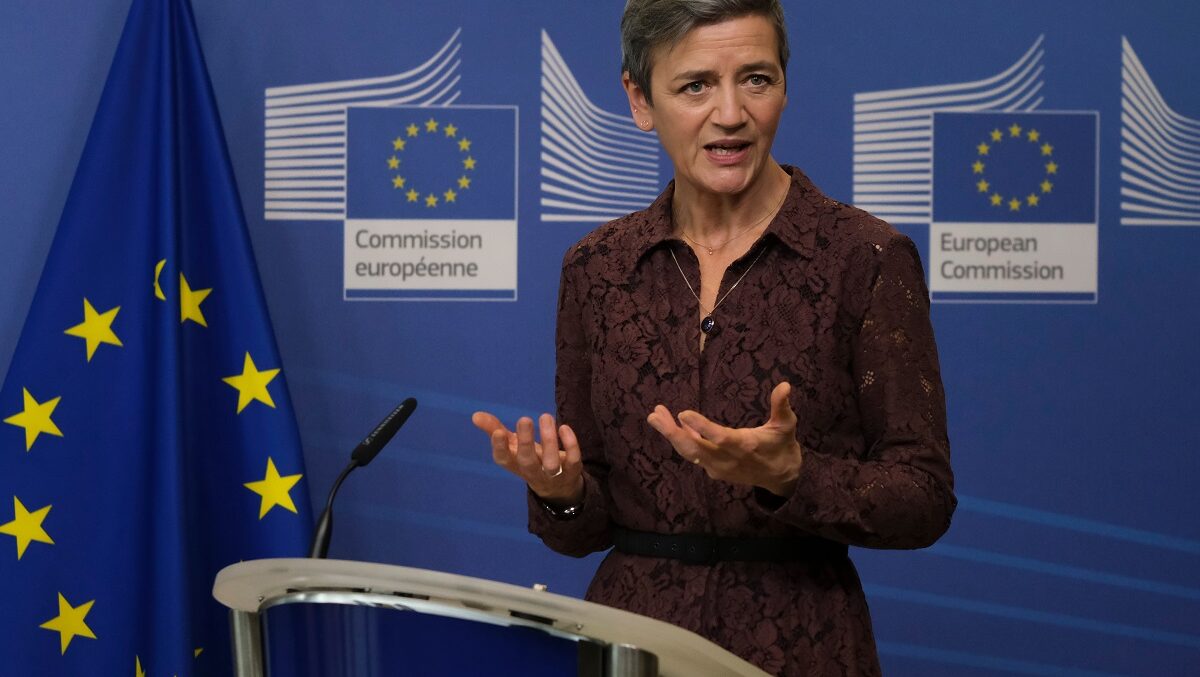
European Commissioner for Competition Margrethe Vestager announced Sept. 5 that she was leaving her position after nearly a decade in charge, which for the last four years has also included holding the title of “executive vice president of the European Commission for a Europe fit for the Digital Age.” Her departure caps off an uncharacteristically tumultuous couple of months for the EU’s competition watchdog, amid a backdrop of looming elections and political infighting. Where the agency goes from here is anyone’s guess.
Recent months have seen growing rumblings about the hit Vestager’s legacy has taken during her second term. Thierry Breton, the commissioner in charge of the internal market, appears to have gained in prominence at Vestager’s expense following the adoption of the Digital Services Act (DSA) and the Digital Markets Act (DMA)—even though the latter piece of legislation was helmed by Vestager.
Vestager’s political capital was further dented by the debacle surrounding Fiona Scott Morton’s nomination to be chief economist of the EU’s Directorate-General for Competition. Despite Vestager’s backing, Scott Morton—an American economist from Yale University— ultimately had to step aside due to concerns about potential conflicts of interest arising from her prior consultancy work, as well as the fact that she was not a European citizen.
Finally, and perhaps most fundamentally, there are rumors of internal strife between proponents of the left-leaning liberalism championed by the Danish Vestager and the more dirigiste vision for Europe (and tech regulation) espoused by the likes of Breton and French President Emmanuel Macron. With Scott Morton’s dismissal and Vestager’s departure, the latter camp appears to have prevailed—at least, until the upcoming European elections.
The result is that competition policy in Brussels is very much in a state of flux. European Commissioner for Justice Didier Reynders of Belgium will assume interim leadership of the Directorate-General for Competition until the 2024 European elections. It is unclear whether and how he will be able to make his mark in such a short time frame.
It is reasonable to assume that Breton will initially be the face of the Commission’s DMA enforcement. Responsibility for the regulation’s implementation is split between both his and Reynders’ directorates, but unlike his colleague, Breton will be familiar with the ins and outs of the legislation. This suggests that Reynders may have limited room to maneuver.
One area where Reynders will have far more leeway is the Commission’s ongoing reform of its abuse-of-dominance enforcement, underpinned by Article 102 of the Treaty on the Functioning of the European Union (TFEU). The Commission announced this spring that it would review how Article 102 is applied, particularly in digital markets. This could have profound implications for European competition law.
A little history is useful here. In early 2009, the Commission issued a guidance paper outlining how it would enforce Article 102 TFEU (which was then Article 82). The consensus at the time was that enforcement was out of touch with modern economic insights. The 2009 reforms sought to address this by making competition enforcement “more economic.” In practice, this meant painstaking investigations into the actual economic effects of firms’ behavior.
It is hard to overstate the influence of this guidance. National competition authorities and courts, as well as the European Court of Justice (particularly during Intel’s successful appeal of a Commission decision and fine) all appear to have espoused the documents’ core themes.
Dissatisfaction with the guidance paper stems first and foremost from the Commission itself. Indeed, it is hard to overstate how much the competition policy zeitgeist has changed since 2009 (to be fair, such changes have not only been seen in Europe). The impetus for effects-based investigation has given way to fears of monopoly in digital markets and calls for enforcers to act more forcefully. This led the Commission to move to amend the existing guidance paper (making it more favorable to the Commission), as well as to start work on new guidelines that would more fundamentally alter its enforcement priorities.
The recent amendments to the guidance—along with the Commission’s policy brief on “A dynamic and workable effects-based approach to abuse of dominance”—appear to confirm a consensus toward seeking to promote “fairness” in the digital economy. While the guidance does not directly affect how antitrust provisions would be interpreted and applied by the courts, it shouldn’t be dismissed as irrelevant. Indeed, while acknowledging that EU case law has largely taken an effects-based approach, the Commission has suggested that the new guidelines would focus on “contributing to a level playing field where markets serve consumers” and “achieving objectives that go beyond consumer welfare, such as plurality in a democratic society.” Toward this goal, the Commission may be primarily interested in limiting the scope of the as-efficient competitor principle and test.
Reynders and the Commission will thus have to decide fundamentally which direction they want to take European competition law. His early pronouncements suggest he is likely to continue Vestager’s reform, but anything is possible—be it making Article 102 enforcement even tougher or opting for a more laissez-faire approach.
The upshot is that Reynders will oversee a reform that could very well dictate the shape of competition enforcement for the next decade. And this could prove to be his primary—or even his only—legacy as competition commissioner. The International Center for Law & Economics (ICLE) will host a conference Sept. 18 in Brussels to discuss these developments.





